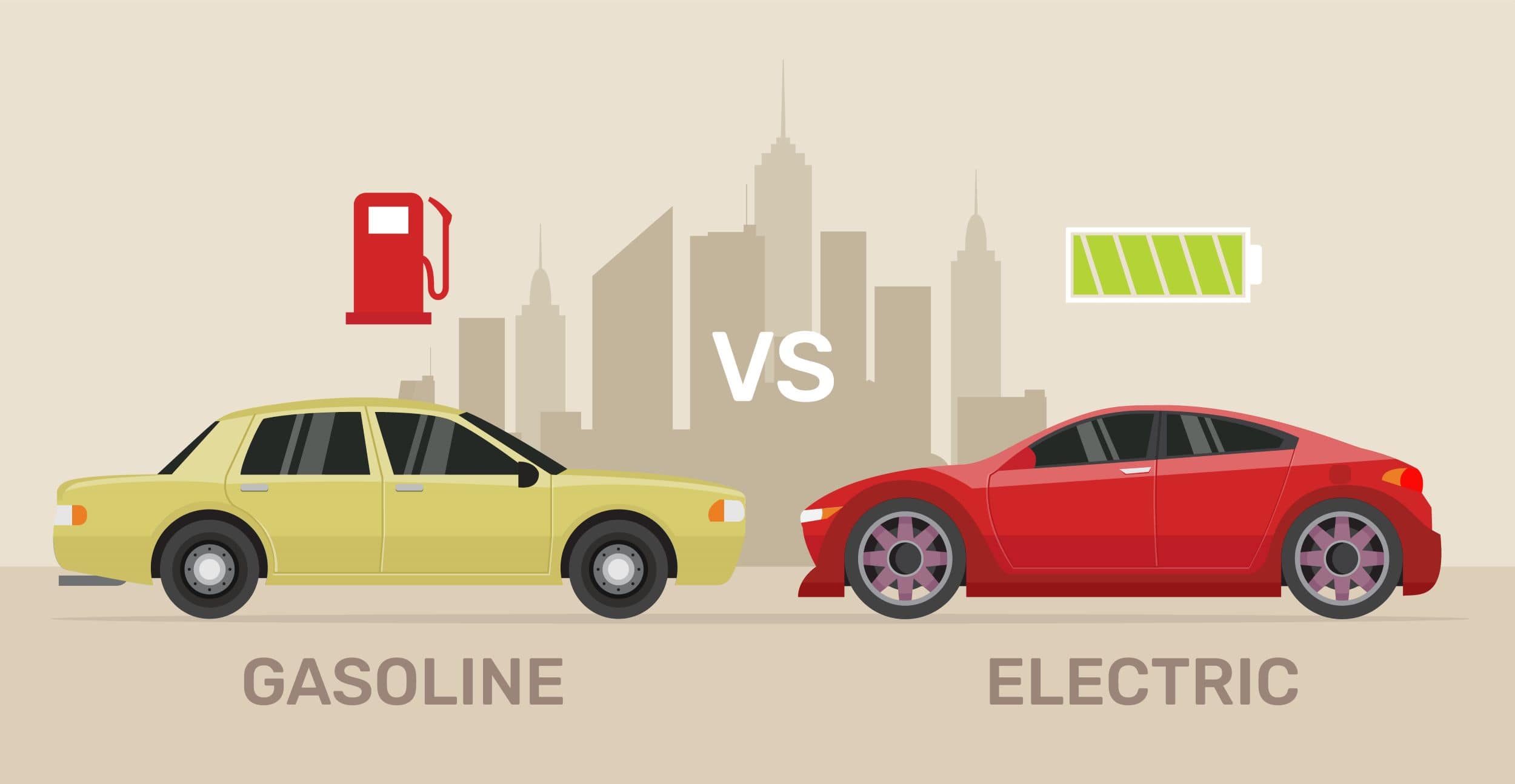Reasons Why EVs Are Safer than Gas-Powered Cars (PDF)
In the ever-evolving world of automobiles, the debate surrounding electric vehicles (EVs) versus their gas-powered counterparts has gained remarkable prominence. One crucial facet of this discourse pertains to safety. Are EVs truly safer than conventional gasoline-powered cars? In this article, we will delve into the critical factors and research findings that shed light on the safety superiority of electric vehicles.

The EV Revolution
Recent years have witnessed a significant shift in consumer perceptions of electric vehicles, driven by technological advancements and improved affordability. More individuals than ever before are expressing keen interest in EVs. These all-electric vehicles are appearing in diverse forms, from various manufacturers. While Tesla is the most well-known, companies like Nissan, BMW, Chevrolet, Volkswagen, Hyundai, and others have introduced a range of EVs with varying price points, performance capabilities, features, and specifications.
The global adoption of EVs is on the rise, leading many to ponder whether these cutting-edge vehicles offer any safety advantages over their gasoline-powered counterparts. Let’s explore the track record.
EVs vs. Gas-Powered Cars: A Safety Comparison
When EVs first emerged, they garnered a reputation for safety concerns, including thermal runaways, electrocution risks, and incidents of seemingly unquenchable fires. However, as EVs gained popularity among consumers and more manufacturers entered the market, researchers found it easier to collect data on their safety.
According to the Insurance Institute for Highway Safety (IIHS), EVs are indeed safer, and this conclusion is supported by recent insurance data analysis. Research shows that injury claims are significantly less frequent for EVs compared to gasoline-powered vehicles.
A study compared EVs and their conventional counterparts for nine different models sold from 2011 to 2019. Researchers scrutinized each vehicle’s property damage liability, collision, and injury claims rates. The results revealed that injury rates associated with EVs were over 40% lower than those of identical conventional vehicles.
In addition to this recent data, the IIHS bestowed its highest safety award, the TOP SAFETY PICK+, upon the brand-new Hyundai Ioniq 5, a compact, fully electric SUV. The Ioniq earned this accolade by achieving excellent ratings in six IIHS crashworthiness assessments and by demonstrating advanced or superior performance in vehicle-to-pedestrian and vehicle-to-vehicle crash tests.
Why Are EVs Safer?
Although electric vehicle technology is still in its infancy, several factors contribute to their reputation for safety compared to internal combustion engine (ICE) vehicles.
Firstly, the presence of gasoline in ICE vehicles inherently makes them more dangerous. Gasoline, which drivers frequently pump into their tanks, is highly flammable and toxic due to the density of hydrocarbons in its structure. It’s essential to note that while EV battery packs are combustible, the gasoline tanks and fuel systems in traditional cars are more volatile, posing more significant risks in the event of a collision.
Another reason for EVs’ enhanced safety lies in their robust front-end construction. Unlike conventional vehicles, EVs lack a front-mounted engine. Consequently, during a collision, EVs typically channel crash energy toward the rear of the vehicle since there is no internal combustion engine in the front. The batteries in EVs are designed to deform and absorb energy in the event of a crash, further enhancing safety.
The third key factor contributing to EVs’ safety is their lower center of gravity. This results from the placement of the battery pack in the lower part of the vehicle. A lower center of gravity means improved stability, which enhances handling and reduces the likelihood of rollovers during sharp turns, thereby preventing accidents.
Making Roads Safer with EVs for All
It’s worth noting that all vehicles on U.S. roads must meet rigorous safety requirements to be sold. The increasing prevalence of EVs on the road signifies that they are no less safe than gasoline-powered cars. As EV technology continues to evolve, we can anticipate further enhancements in safety features that will benefit passengers, pedestrians, and drivers alike.
What Sets EVs Apart in Terms of Safety?
Switching to an electric vehicle offers numerous advantages, including economic savings, ecological benefits, and practical advantages. One key benefit that should not be overlooked is the superior safety of EVs. This safety advantage can be attributed to factors such as vehicle age, EV-specific safety features, and weight distribution benefits.
Vehicle Age
Electric vehicle adoption is a relatively recent phenomenon. In early 2022, new gasoline-powered car sales declined by 20% compared to the previous year, while EV sales saw a 37% increase during the same period. Newer vehicles, including many EVs, are built with advanced engineering and incorporate more safety features to protect passengers. In 2022, out of 32 new vehicles rated by the National Highway Traffic Safety Administration (NHTSA), 13 EVs and hybrids received five-star safety ratings.
Passenger Safety
Studies from the Insurance Institute for Highway Safety (IIHS) indicate that the likelihood of injuries in accidents involving EVs is significantly lower for both drivers and passengers compared to gasoline and diesel-powered vehicles. Injury claim rates for EV occupants were found to be over 40% lower than their ICE counterparts in the study, which compared claims data from electric and ICE versions of nine vehicles sold between 2011 and 2019.
Fire Risk
While electric vehicle-related fires have garnered significant media attention, traditional gasoline-powered vehicles are subject to more recalls due to fire-related concerns than EVs. Gasoline is volatile and flammable, and in the event of an accident, a damaged gas tank can lead to catastrophic consequences. On the other hand, the risk of fires in EVs is significantly lower. A study found that ICE-powered cars had 1,530 fire incidents per 100,000 vehicles sold, while EVs had only 25 fires per 100,000 vehicles sold.
EV-Specific Safety Features
Electric vehicles are equipped with built-in safety features designed to mitigate risks associated with battery-related issues, such as fires or spills. These features shut down electrical systems when a crash is detected, safeguarding against potential hazards. Additionally, EVs are engineered to ensure that the battery remains secure within the vehicle’s structure, preventing intrusion into the passenger area in the event of a collision.
Lower Center of Gravity
Electric vehicles have a lower center of gravity due to the placement of the battery and electric motor. This lower center of gravity enhances traction, stability, and safety. It reduces the risk of rollovers, especially during abrupt maneuvers or hard turns, making EVs safer on the road.
Enhanced Brakes
Electric vehicles, generally heavier than traditional cars, are equipped with powerful, larger brakes to ensure safe and efficient stopping. Some EVs incorporate regenerative braking systems, which not only aid in stopping but also contribute to a lower center of mass, further improving stability and safety. Moreover, regenerative braking recovers energy during braking, extending the vehicle’s range and reducing wear and tear on the braking system.
Electric vehicles are on the rise, and their safety advantages over traditional gasoline-powered vehicles continue to grow as EV technology evolves. This information is vital for the majority of the population who are either considering an EV or have already embraced the electric transportation revolution. Keep in mind that around 80% of EV charging is done at home, typically overnight, making it convenient for EV owners. Installing a Level 2 charger at home further enhances the ease of charging.
To Review
The evidence suggests that electric vehicles are not only more environmentally friendly but also safer than traditional cars. With advanced safety features, a lower center of gravity, and a reduced risk of fire, EVs provide a compelling case for those seeking an eco-friendly and safe mode of transportation.
If you’re into EVs or have questions about this type of car, check out this other article: Top EV-Related Questions Answered





